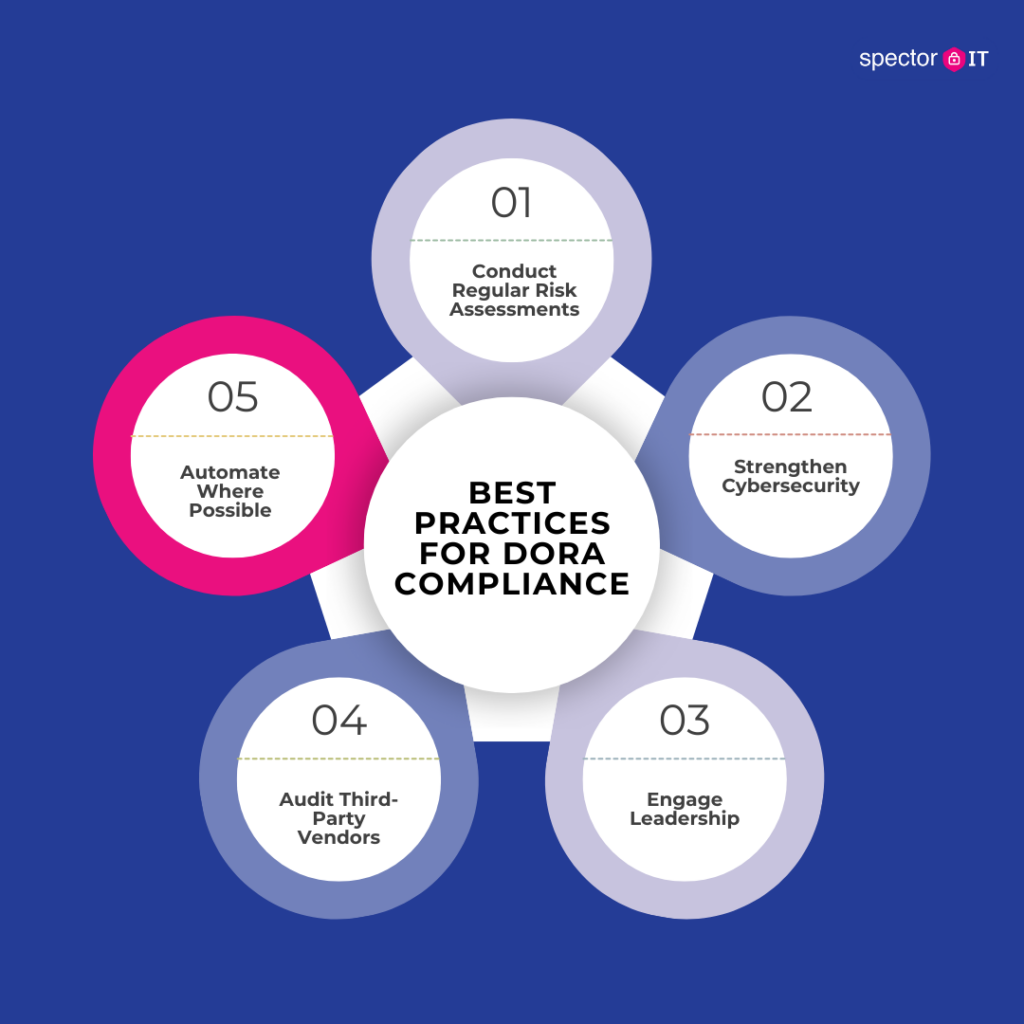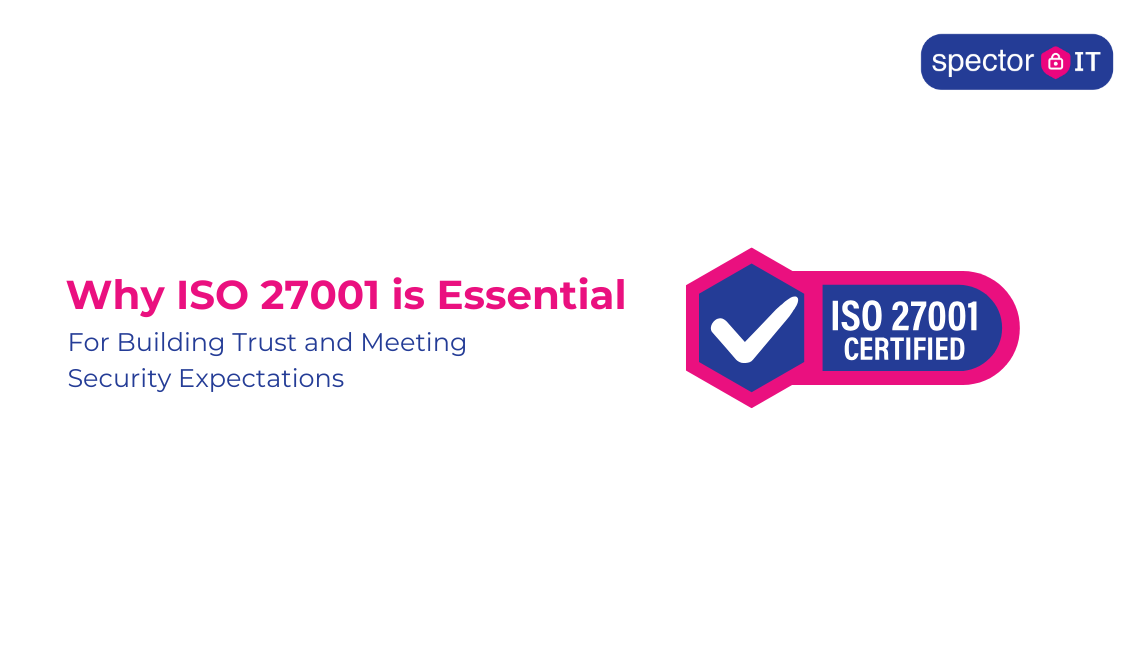
Top Challenges for Small Financial Firms in Achieving DORA Compliance
As the Digital Operational Resilience Act (DORA) comes into force across the European Union, small financial firms find themselves navigating a complex regulatory landscape. DORA is designed to strengthen the digital resilience of financial institutions, ensuring they can withstand cyber threats and operational disruptions.
While the intent is crucial, achieving DORA compliance presents unique challenges for smaller firms, especially those with limited resources.
At Spector IT, we specialize in guiding small financial firms in Ireland through these complexities, helping them turn compliance challenges into opportunities for growth and resilience. Let’s examine the key challenges, practical solutions, and the urgency of early action.
What is DORA Compliance and Why Does it Matter?
The Digital Operational Resilience Act (DORA) mandates that financial entities, such as banks, credit institutions, and accountancy firms, adopt robust ICT (Information and Communication Technology) practices to prevent and recover from operational failures.
Why Compliance Matters:
- Data Protection: Safeguard sensitive financial information from breaches.
- Trust Building: Maintain customer confidence by ensuring operational stability.
- Competitiveness: Stay ahead in an increasingly digitized financial landscape.
- Penalty Avoidance: Non-compliance risks hefty fines and reputational damage.
Key Challenges in DORA Compliance
1. Resource Constraints
- Challenge: Many small firms lack the budget, time, and specialized personnel to implement DORA’s requirements.
- Solution: Partnering with an expert like Spector IT can bridge the gap, providing cost-effective solutions tailored to your needs.
- Statistic: 60% of SMEs in the EU report difficulties understanding and implementing cybersecurity regulations. (Source: EU Digital Resilience Report)
2. Operational Changes
- Challenge: Updating ICT policies, enhancing cybersecurity, and streamlining data management can disrupt daily workflows.
- Solution: Conduct a structured gap analysis to prioritize necessary changes and minimize operational disruptions.
- Best Practice: Implement a phased approach to align updates with DORA requirements without overwhelming your team.
3. Governance and Accountability
- Challenge: DORA emphasizes leadership involvement, requiring internal audits, clear responsibilities, and oversight of ICT risk management.
- Solution: Develop a governance framework that assigns roles and accountability for compliance.
4. Managing Third-Party Risks
- Challenge: Monitoring and managing ICT service providers to ensure their compliance can be time-intensive and complex.
- Solution: Use tools and contracts to enforce compliance standards with third-party vendors, ensuring ongoing assessments.
- Statistic: 39% of small businesses fail to conduct due diligence on third-party providers, increasing exposure to risks. (Source: Deloitte SME Risk Report)
5. Continuous Testing and Updates
- Challenge: Regular testing of ICT systems is resource-intensive and technically complex.
- Solution: Automate testing processes and schedule periodic reviews with external experts to maintain compliance.
How Spector IT Supports DORA Compliance
At Spector IT, we have extensive experience helping small financial firms achieve compliance with minimal disruption.
1. Expertise and Resources
We simplify complex DORA requirements into actionable steps, providing your team with the knowledge and resources to stay compliant.
2. Proactive Monitoring
Our continuous monitoring services identify vulnerabilities early, ensuring seamless operations and reduced risk exposure.
3. Incident Response and Recovery
In case of a security breach or operational disruption, our rapid response minimizes downtime and protects your firm’s reputation.
4. Comprehensive Compliance Assistance
From gap analyses to documentation management, we handle the heavy lifting so you can focus on your core business activities.
5. Employee Training
We offer customized training programs, ensuring all employees understand their role in maintaining compliance and fostering resilience.
Best Practices for DORA Compliance

-
Conduct Regular Risk Assessments:
Identify vulnerabilities and prioritize actions to mitigate risks.
-
Strengthen Cybersecurity:
Implement multi-factor authentication (MFA), endpoint protection, and routine updates.
-
Engage Leadership:
Involve senior management in ICT governance to ensure accountability.
-
Audit Third-Party Vendors:
Regularly assess vendor compliance and maintain detailed contracts outlining requirements.
-
Automate Where Possible:
Leverage automation tools to streamline testing and monitoring processes.
Industry FAQs on DORA Compliance
-
What is the deadline for DORA compliance?
Firms must comply with DORA by January 2025, but starting now is crucial to avoid delays and rushed implementations.
-
How does DORA affect small firms differently from larger ones?
Small firms often face challenges like resource constraints and limited expertise, making external support critical for compliance.
-
How can I manage third-party risks under DORA?
Perform due diligence when selecting vendors, enforce compliance through contracts, and schedule regular assessments.
-
What happens if my firm isn’t DORA compliant?
Non-compliance can result in penalties, reputational damage, and potential data breaches that disrupt operations.
-
How long does it take to become DORA compliant?
The timeline varies but can range from 6-12 months depending on the size of your firm and the scope of required changes.
Why Act Now?
The DORA compliance deadline is approaching fast, and certification bodies are booking up quickly. Waiting too long could result in missed deadlines, rushed processes, or even regulatory penalties. Starting now not only ensures compliance but also strengthens your business’s resilience.
Simplify Your DORA Compliance Journey with Spector IT
Spector IT specializes in helping small financial firms achieve DORA compliance with minimal disruption. From expert guidance to proactive monitoring, our tailored solutions ensure your firm thrives in a secure and resilient environment.
Schedule a free consultation today to discuss your compliance needs. Click here to get started!

